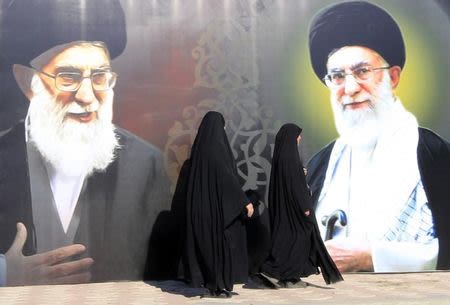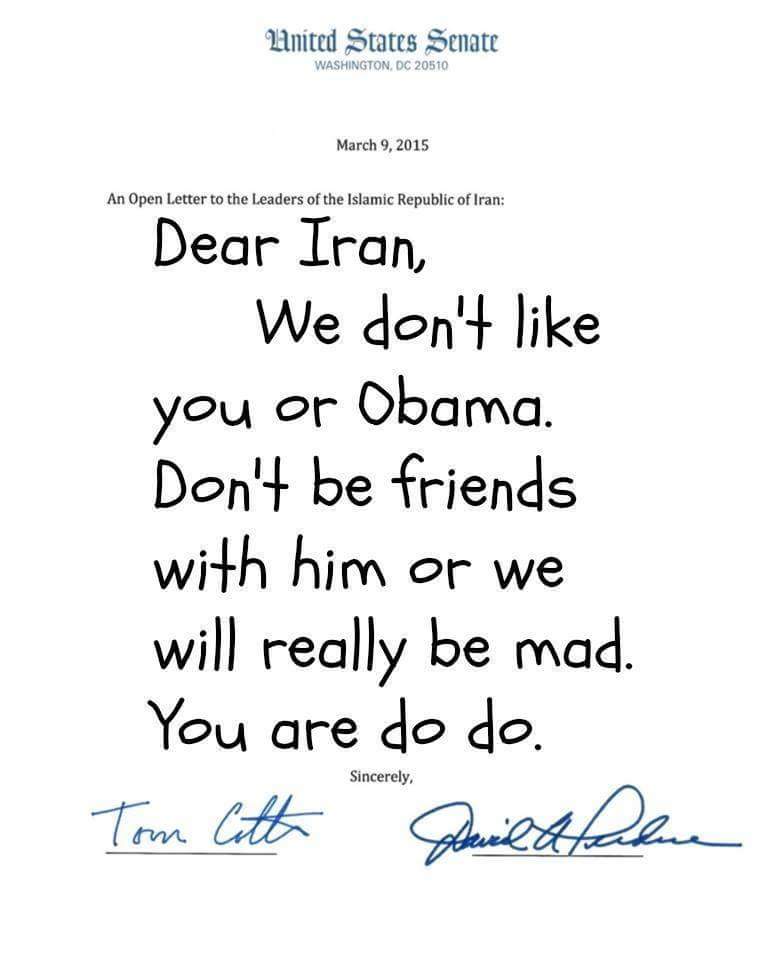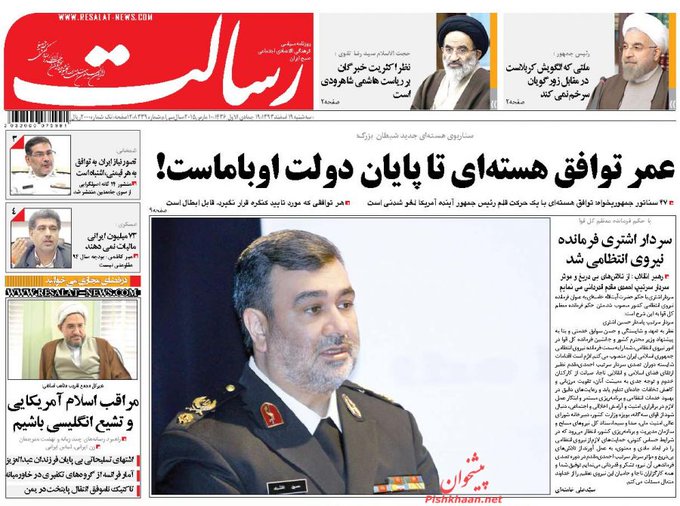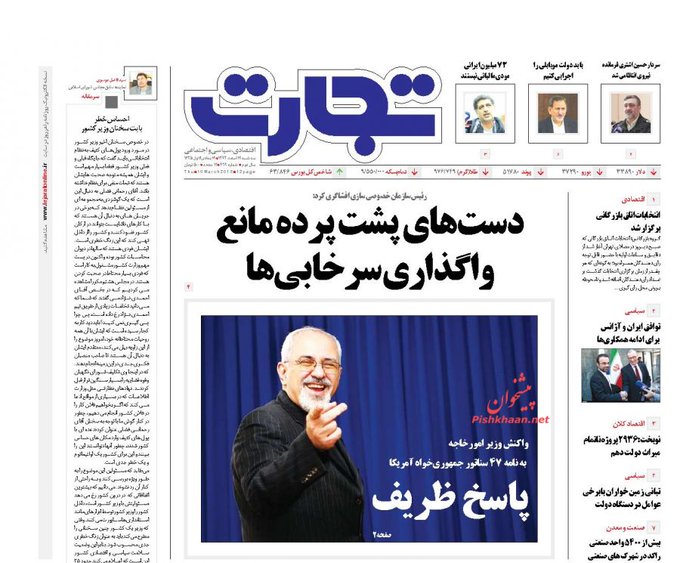
Ayatollah Ali Khamenei, the ultimate authority on all Iranian matters of state, added at a meeting with President Hassan Rouhani and senior clerics that whenever negotiators made progress, the Americans became “harsher, tougher and coarser”.
The letter signed by 47 Republican senators warned Iran that any nuclear deal made with U.S. President Barack Obama, a Democrat, could last only as long as he remained in office – an unusual intervention into U.S. foreign policy-making.
The White House has described the letter as “reckless” and “irresponsible,” saying it interfered with efforts by six major powers to negotiate with Iran on a deal to prevent it from building a nuclear bomb.
Mehr quoted Khamenei as saying: “Of course I am worried, because the other side is known foropacity, deceit and backstabbing.
“Every time we reach a stage where the end of the negotiations is in sight, the tone of the other side, specifically the Americans, becomes harsher, coarser and tougher. This is the nature of their tricks and deceptions.” The clerical Supreme Leader said the letter was “a sign of the decay of political ethics in the American system”, and he described as risible long-standing U.S. accusations of Iranian involvement in terrorism.
The clerical Supreme Leader said the letter was “a sign of the decay of political ethics in the American system”, and he described as risible long-standing U.S. accusations of Iranian involvement in terrorism.
U.S. Secretary of State John Kerry, Washington’s chief nuclear negotiator, voiced “utter disbelief” at the senators’ action, saying the notion that they could alter any executive accord between government leaders was “flat wrong”.
KHAMENEI BALANCING ACT
Khamenei has long been a conservative hardliner wary of any detente with the West but has backed the diplomacy pursued by Rouhani, who was elected by a landslide in 2013 promising steps to end Iran’s economically crippling international isolation.
At the same time, Khamenei has not stopped speeches larded with denunciations of the United States to reassure powerful hardliners in the clergy and security services, for whom anti-U.S. sentiment has been central to Iran’s Islamic Revolution.
The nuclear negotiations, which resume in Lausanne, Switzerland, next week, are at a critical juncture as the sides try to meet an end of March target for an outline accord, with June 30 the deadline for a detailed, final agreement.
Iran and the powers have twice extended their deadline to conclude the negotiations, which aim to place curbs on Iran’s nuclear energy capacity to help ensure it cannot develop nuclear bombs. In return, Iran would secure a removal of sanctions that have severely damaged Iran’s oil-based economy.
The Islamic Republic dismisses Western suspicions that it aims to develop nuclear weapons, saying its atomic energy program is only for peaceful purposes.
Khamenei also criticized a March 3 speech to Congress by Israeli Prime Minister Benjamin Netanyahu on Tehran’s nuclear program, describing it as remarks “by a Zionist clown”.
In the speech, in which he aligned himself with Obama’s hawkish Republican foes, Netanyahu warned Washington that it was negotiating a bad deal with Iran that could spark a “nuclear nightmare”.
Israel, the only Middle East state with a presumed nuclear arsenal, regards Iran’s nuclear agenda as a threat and is dismissive of the talks, suggesting Tehran is only trying to buy time to become a threshold nuclear power.
Khamenei also repeated a call for Iran’s economy to diversify away from oil revenues to reduce the effectiveness of international sanctions isolating the oil sector. “If the country and economy were not dependent on oil revenues… could the enemy harm us with sanctions?” he said.
Reuters
Earlier, Related story showing controversial letter (NY Times):
Republicans’ Iran Letter Ignites Fierce ‘#47Traitors’ Debate Online
The political conversation on social networks in the United States this week continues to be dominated by a partisan debate over the open letter to the leaders of Iran posted online Monday by 47 Republican senators.
Outraged Democrats, eager to defend President Obama’s effort to negotiate a deal intended to prevent Iran from developing nuclear weapons, posted tens of thousands of messages on Twitter. They used the tag #47Traitors to describe the Republicans who signed the letter and who the Democrats say are undermining the president’s authority.

Supporters of the letter from Senator Tom Cotton of Arkansas responded indignantly on the same thread and tried to create a more flattering one,#47Patriots.
Supporters of the letter from Senator Tom Cotton of Arkansas responded indignantly on the same thread and tried to create a more flattering one,#47Patriots.
As a result, the response to the letter has been at or near the top of Twitter’s trending topics for three days.
The #47traitors tag was used more than 208,000 times by Wednesday afternoon, according to data compiled by Brandwatch, a technology firm that tracks discussions on social networks. The firm noted that the intensity of the Twitter mentions spiked on Tuesday, after Hillary Rodham Clinton denounced the letter during a televised news conference at the United Nations.
Although partisans on both sides of the political divide used the tag, Brandwatch reported that there were more than three negative messages about the letter’s signatories for every positive one. There were just over 9,500 messages tagged #47Patriots, by contrast.
The avalanche of angry conversations over the letter, under various hashtags or none, seemed to illustrate that the subject of war and peace in the Middle East gains most traction among Americans when there is a partisan divide over American foreign policy, as there was regarding the invasion of Iraq.
The online conversation about the letter included sharp comments from a number of officials and pundits, including William Kristol, whose Emergency Committee for Israel donated heavily to Mr. Cotton’s Senate campaign.
The debate over the letter also drew its author into a direct dialogue on Twitter with Iran’s foreign minister, Mohammad Javad Zarif. After Mr. Cotton alerted Mr. Zarif to a Persian translation of the letter, the American-educated diplomat responded with a copy of his detailed reply in English.
Beyond simply demonstrating his mastery of English, in his answer to the letter Mr. Zarif accused the Republican senators of failing to understand either their own Constitution or that the negotiations, between Iran and the five permanent members of the United Nations Security Council plus Germany, were not, in fact, intended to produce the sort of bilateral treaty between the United States and Iran that would require ratification by the Senate.
Mr. Zarif’s reply was heartily applauded by Iranians on social networks, according to the BBC Persian correspondent Bahman Kalbasi.
It remains to be seen whether the uproar over the letter will ultimately help or hinder the negotiations, but Sobhan Hassanvand, the social media editor of Iran’s Shargh Daily, noted that in Tehran, too, there was a clear partisan divide over the letter. While newspapers close to the hard-line conservatives opposed to any deal focused on the letter, Mr. Hassanvand noted, the front pages of reformist dailies featured Mr. Zarif’s reply.

Iran hardline dailies have GOP letter on front pages that possible nuclear deal won’t last after Obama – #IranTalks

ran reformist dailies have @JZarif response to GOP letter on front page, unlike right dailies having #IranLetter






























